Affect vs. Effect: How to Tell Them Apart?
Still confused about affect vs effect? Learn the difference, meaning, and correct usage with examples, tips, and a grammar guide. Plus, discover how real practice makes learning stick.
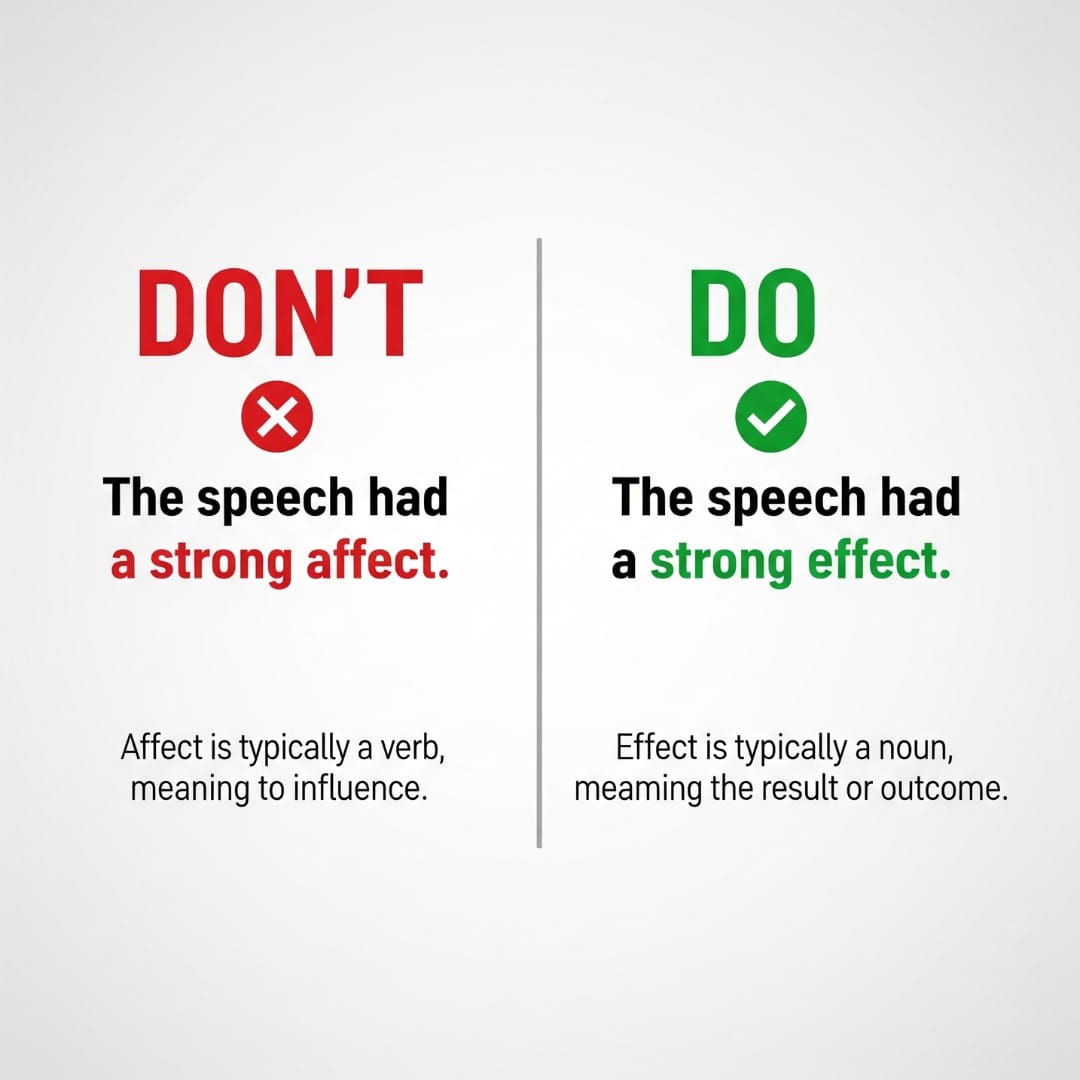
The Classic English Confusion
Few word pairs cause as much trouble as affect and effect. They sound almost the same. They’re spelled nearly the same. And both have meanings related to change. No wonder people freeze up when typing:
“Will this policy affect… or effect… the outcome?”
If you’ve ever scratched your head over this, you’re not alone. Even native speakers slip up. And in professional settings, these mistakes can affect your credibility and leave the wrong effect on colleagues.
This blog will clear up the confusion with easy grammar rules, examples, memory tricks, and practice activities. By the end, you’ll confidently know when to use affect and when to use effect.
The Core Difference (The 5-Second Rule)
The simplest way to remember:
Affect = Verb = To influence or make a change
Effect = Noun = The result or outcome of that change
✅ Example:
“The weather will affect our travel plans.” (verb: influence)
“The rain had a negative effect on the picnic.” (noun: result)
Memory Trick:
A = Action = Affect (verb)
E = End result = Effect (noun)
Once you master this basic distinction, 90% of the confusion disappears.
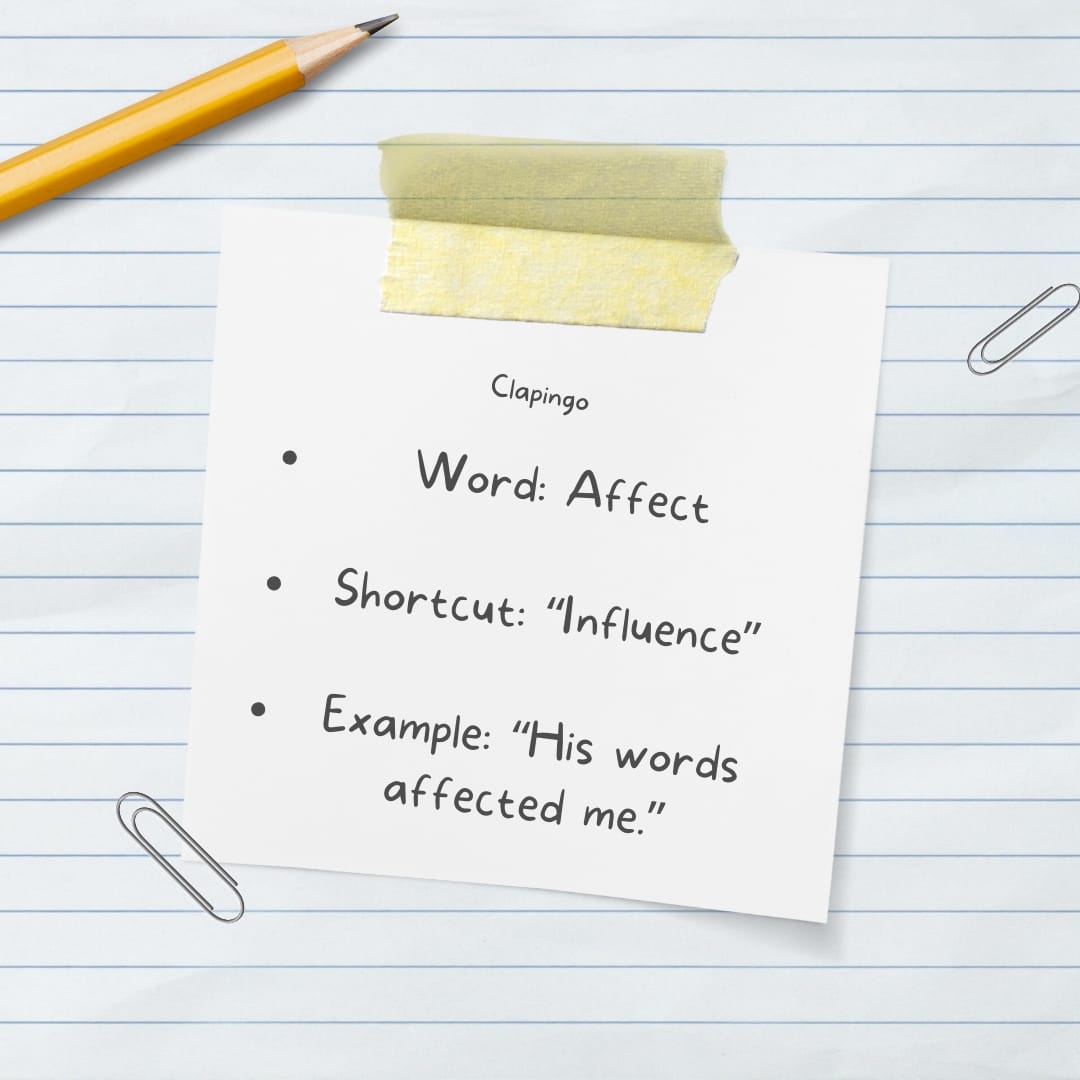
Deep Dive into Affect (Verb)
Definition:
Affect usually means to act upon or influence something.
Common Uses:
Everyday life:
“The noise outside affected my sleep.”
“The power cut affected all the shops.”
Professional settings:
“High inflation will affect consumer spending.”
“Leadership style affects team morale.”
Emotional influence:
“Her kindness affected me deeply.”
Clapingo Grammar Tip
If you can replace the word with influence, alter, or change, you’re likely dealing with affect.
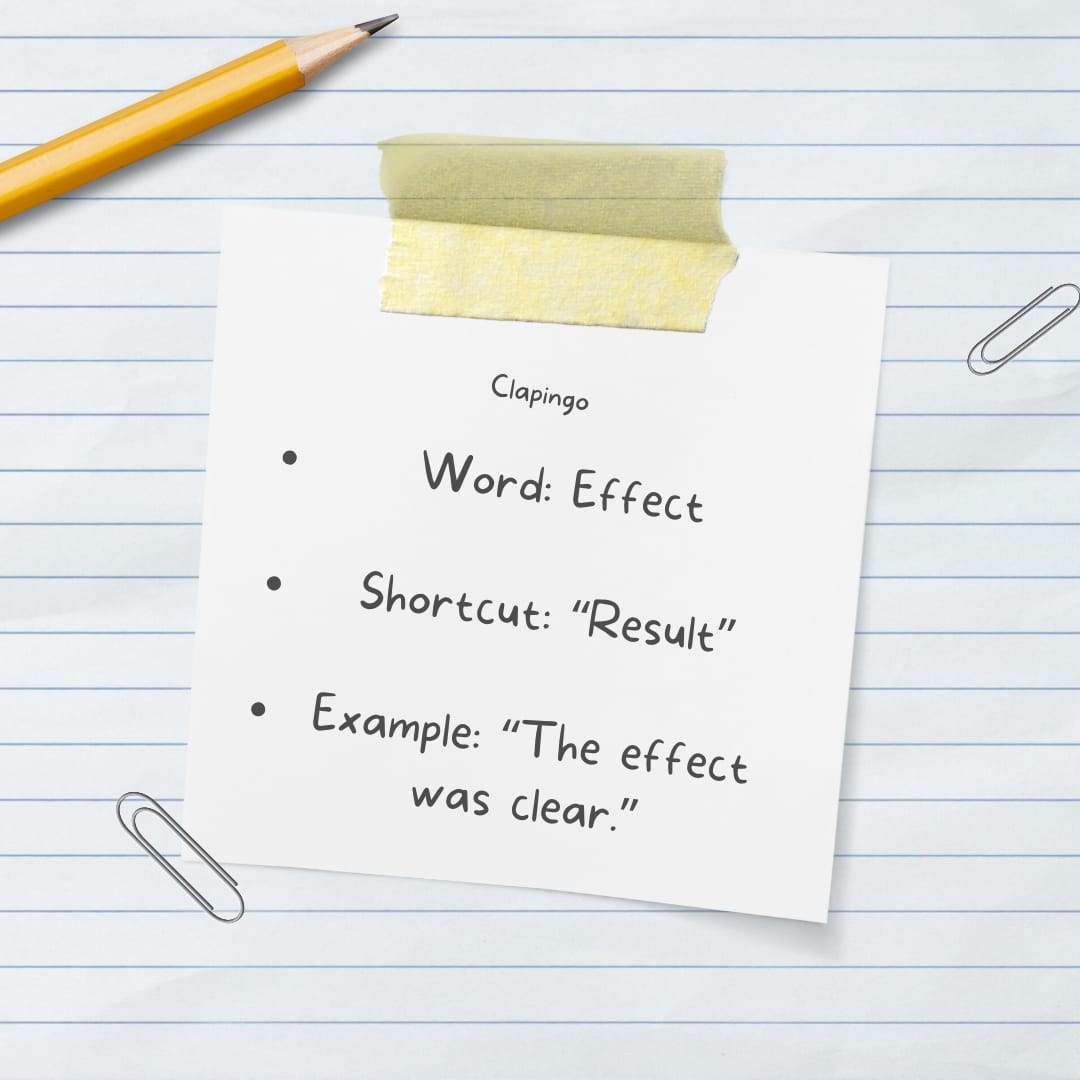
Deep Dive into Effect (Noun)
Definition
Effect refers to the result, consequence, or outcome of an action.
Common Uses
Everyday life:
“The effect of drinking coffee late was a sleepless night.”
“Exercise has positive effects on health.”
Professional settings:
“The new software had a major effect on productivity.”
“Policy changes produced immediate effects in the market.”
Cause-and-effect structure:
“Every cause has an effect.”
Clapingo Grammar Tip
If you can put the, an, or any before it , the effect, an effect, any effect - you’re likely using it correctly.
Exceptions You Must Know
English wouldn’t be English without curveballs:
Affect as a Noun (Psychology)
Meaning: emotional state or outward display of mood.
Example: “The patient showed a flat affect.”
Effect as a Verb
Meaning: to bring about or make something happen.
Example: “The new manager effected positive changes.”
Often found in formal writing, politics, and law.
Clapingo Pro Tip: These exceptions are less common. Stick to the main rule for daily writing and speaking.
Common Mistakes to Avoid
Here are the most frequent slip-ups:
- ❌ “The speech had a strong affect.”
✅ “The speech had a strong effect.”
- ❌ “The new policy will effect our sales.”
✅ “The new policy will affect our sales.”
- ❌ “His words effected me emotionally.”
✅ “His words affected me emotionally.”
Clapingo Grammar Note: If you’re talking about influence, use affect. If you’re describing the result, use effect.
For more simple explanations like this one, check out our blog: Decode English: Understand and Use 'Presume vs Assume' with Simple Examples
Professional Contexts Where It Matters
Mistakes with affect and effect are more than grammar errors, they can affect clarity in the workplace.
1. Emails & Reports
Incorrect: “The delay will effect client relationships.”
Correct: “The delay will affect client relationships.”
2. Presentations
Incorrect: “The training had a positive affect.”
Correct: “The training had a positive effect.”
3. Interviews
Incorrect: “The new environment will effect my work style.”
Correct: “The new environment will affect my work style.”
Clapingo Pro Tip - First impressions matter. Grammar slips can make you sound less confident.
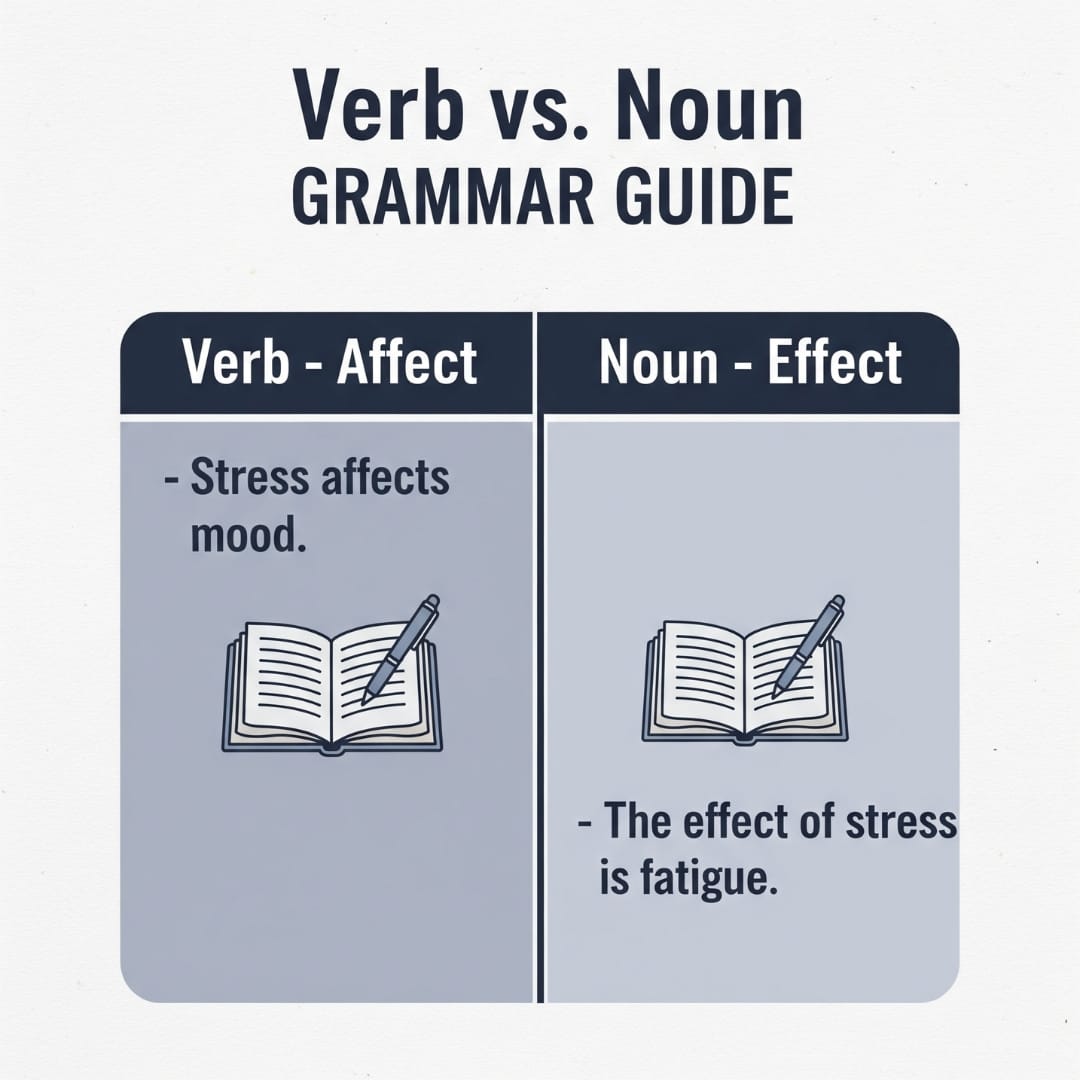
Advanced Grammar Guide – Verb vs. Noun
Here’s how affect and effect fit into sentence structure:
Verb (Affect): Comes after the subject, before the object.
Example: “The storm affected travel.”
Subject = storm → Verb = affected → Object = travel
Noun (Effect): Acts as subject or object.
Example: “The effect was widespread.” (Subject = effect)
Example: “We noticed the effect of the storm.” (Object = effect)
Mini Rule:
If the word does the action → use affect.
If the word receives the action/result → use effect.
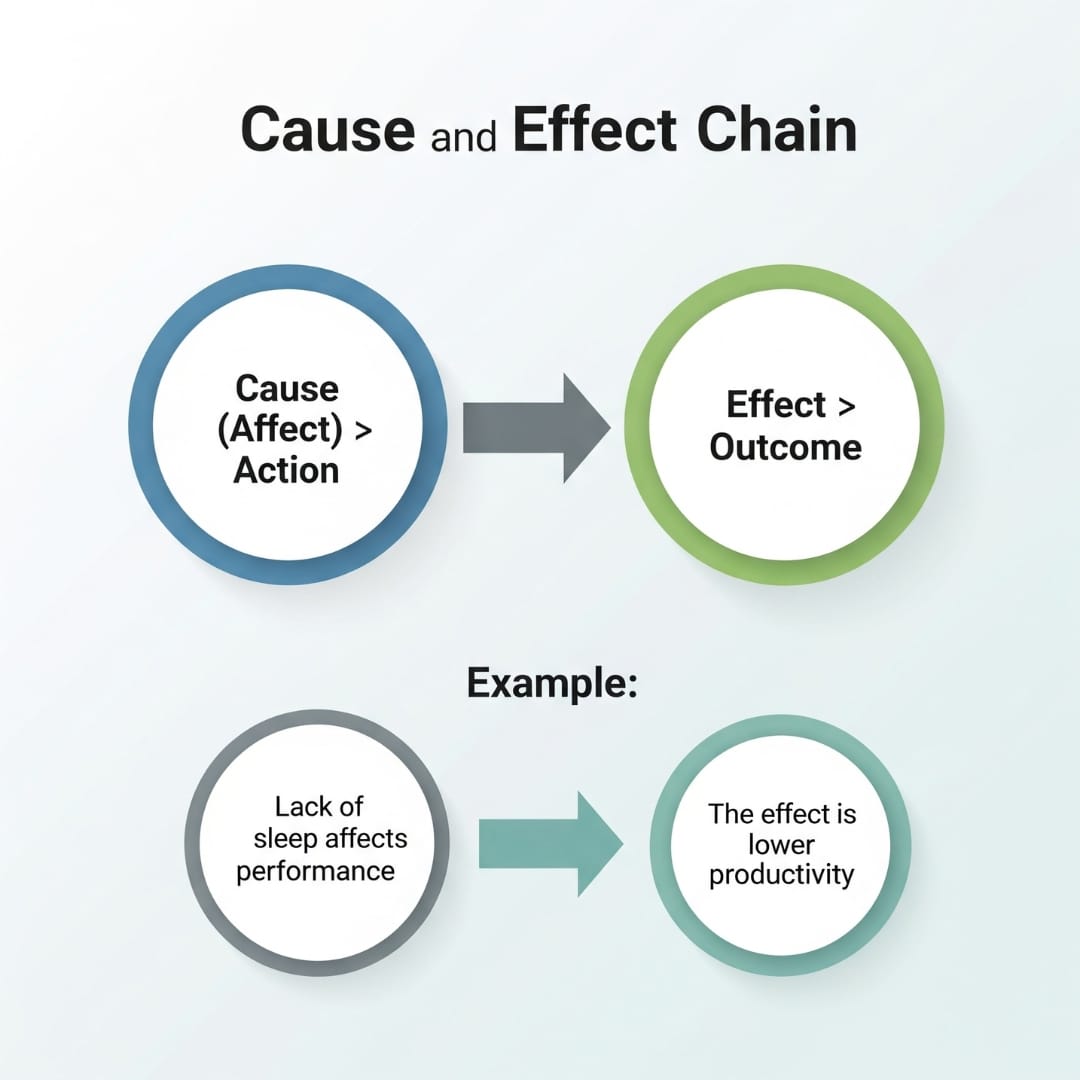
Quick Memory Tricks
Word Association:
Affect = Action
Effect = End result
Substitution Test:
If you can swap in influence, use affect.
If you can swap in result, use effect.
Visual Cue:
Picture dominoes: the push (affect) → the fall (effect).
A Simple Rhyme:
“Affect makes it happen, Effect is what happened.”
Subtle Meaning Differences
While affect and effect often overlap, choosing one over the other can shift nuance:
“The speech affected me.” → Emphasizes personal impact (emotional).
“The speech had an effect on me.” → Emphasizes the resulting state.
In persuasive writing, affect feels immediate and emotional. In analytical writing, effect feels measured and factual.
Clapingo Exercises and Quizzes
Fill-in-the-Blanks
The new law will ___ small businesses.
The ___ of social media is seen everywhere.
Poor internet ___ online classes badly.
The training had a lasting ___.
Stress can ___ performance at work.
Answers: 1. affect, 2. effect, 3. affects, 4. effect, 5. affect
Spot the Mistake
“The meeting will effect the project.”
Correction: affect
“The speech had a strong affect on me.”
Correction: effect
Rewrite Exercise
Take the sentence: “His leadership affected the team, and the effect was more collaboration.”
→ Create your own versions with workplace examples.
Advanced Practice Drill – Transformation Exercise
Rewrite the following pairs using both affect and effect.
1. Climate change is changing weather patterns.
- Rewrite with affect.
- Rewrite with effect.
2. The teacher’s approach improved learning outcomes.
- Rewrite with affect.
- Rewrite with effect.
3. Technology has reshaped communication.
- Rewrite with affect.
- Rewrite with effect.
(Answer Key: You can create parallel versions: “Climate change affects weather patterns.” vs. “The effect of climate change is visible in weather patterns.” etc.)
Did You Know?
- The confusion between affect and effect dates back over 600 years.
- Shakespeare used both, often for dramatic effect.
- “Cause and effect” is one of the most common scientific phrases worldwide.
- Many style guides call affect vs effect the #1 most common grammar mistake among professionals.
Clapingo Tip – Practice in Real Conversations
At Clapingo, many learners know the rules but struggle to apply them while speaking. Why? Because in fast conversations, you don’t have time to pause and think “verb or noun?”
In Clapingo’s one-on-one sessions, tutors help you:
- Practice natural dialogues using affect and effect.
- Correct you instantly when you slip up.
- Build confidence so usage becomes automatic.
Example Roleplay from a Clapingo Session:
Clapingo Expert: “How does stress affect your productivity?”
Clapingo Learner: “The effect is clear. I make more mistakes.”
Case Study – Mistakes in the Workplace
Scenario 1: Business Report
Incorrect: “The delay will effect revenue.”
Impact:Miscommunication, looks unprofessional.
Corrected: “The delay will affect revenue.”
Scenario 2: Job Interview
Incorrect: “The effect of my skills will affect the team.” (redundant/confusing)
Corrected: “My skills will affect the team positively.”
These errors are tiny but can affect hiring decisions or the effect of your presentation.
Clapingo Pro Tip – Sounding Like a Professional
At higher levels, success is not just about avoiding mistakes, it’s about choosing the right tone. Clapingo mentors guide advanced learners on:
- Using affect to sound empathetic and persuasive.
- Using effect to sound data-driven and credible.
- Switching naturally between workplace English, academic English, and casual conversation.
Example Coaching Exercise at Clapingo:
Clapingo Expert: “How would you rephrase this sentence for a client vs. a research paper?”
Clapingo Learner: Practices both affect (verb-driven) and effect (noun-driven) versions.
Clapingo Tips & Tricks
- Remember the A/E rule: Affect = Action, Effect = End.
- Do the substitution test.
- Practice daily sentences: Write 3 with affect, 3 with effect.
- Get real feedback - tools like Grammarly help, but live correction (like Clapingo) works best.
Collocations and Common Phrases
Affect and effect appear in specific collocations (word partnerships). Mastering these makes your English sound advanced.
With Affect
- Directly affect → “The new rule directly affects profits.”
- Negatively affect → “Delays negatively affect customer trust.”
- Profoundly affect → “Her book profoundly affected modern thinking.”
With Effect
- Take effect → “The policy will take effect next month.”
- Cause and effect → “Every experiment studies cause and effect.”
- In effect → “The rule is, in effect, a ban.”
- Knock-on effect → “The strike had a knock-on effect on supply chains.”
Clapingo Pro Tip: Using these collocations shows mastery beyond basic grammar.
Idioms and Figurative Uses
Affect and effect also appear in idiomatic or figurative expressions:
- Domino effect → One event triggers a chain of others.
“The layoff had a domino effect across the industry.”
- Ripple effect → A small action spreads wide.
“Her kindness created a ripple effect in the community.”
- Special effects → Visual or audio illusions in film.
- Sound effects → Added noises in movies or media.
Clapingo Tip for Advanced learners: Recognize when “effect” shifts into idiomatic territory. These uses often mean “impact” in creative ways.
Stylistic Nuances of Affect vs. Effect
Beyond grammar, these words carry stylistic weight in professional writing.
Using effect as a noun often feels formal and precise.
- Example: “The effect of the new law was profound.”
Using affect as a verb feels more direct and dynamic.
- Example: “The law affected millions of citizens.”
Clapingo Tip for professionals: Choose effect in reports, research papers, and academic writing to emphasize outcomes. Choose affect in persuasive writing, presentations, or business pitches to highlight action.
Synonyms and Substitutions (Advanced Vocabulary)
If you want to vary your writing and avoid repetition, here are high-level synonyms:
Instead of Affect (verb):
Influence
Alter
Shape
Modify
Transform
Instead of Effect (noun):
Outcome
Result
Consequence
Impact
Ramification
Example: Instead of “The new law affected the market,” write:
“The new law shaped the market.”
“The effect of the new law had widespread consequences.”
Historical and Linguistic Insights
Did you know?
Both words come from Latin roots:
Affectare → to strive after, influence (verb).
Effectus → result, accomplishment (noun).
They entered English in the 14th century and have been confusing people ever since.
Advanced writers sometimes play with both words in the same sentence for style:
“Her words affected me deeply, and the effect was lasting.”
Regional English Differences
American English: Tends to use affect = verb, effect = noun almost exclusively.
British English: Same rule, but you’ll see effect as a verb more often in formal/legal writing.
Example (UK gov’t): “The policy will effect significant reforms.”
Affect and Effect in Academic Writing
In research, reports, and scientific papers, precision is critical. Misusing these words can damage credibility.
- In hypotheses:
“Does caffeine affect concentration?”
- In results:
“The effect of caffeine was a 15% improvement in focus.”
- In discussions:
“This may affect how future studies are designed.”
Clapingo Pro Tip: In academic writing, effect is often used in the phrase “the effect of X on Y.” Example: “The effect of diet on heart health was significant.”
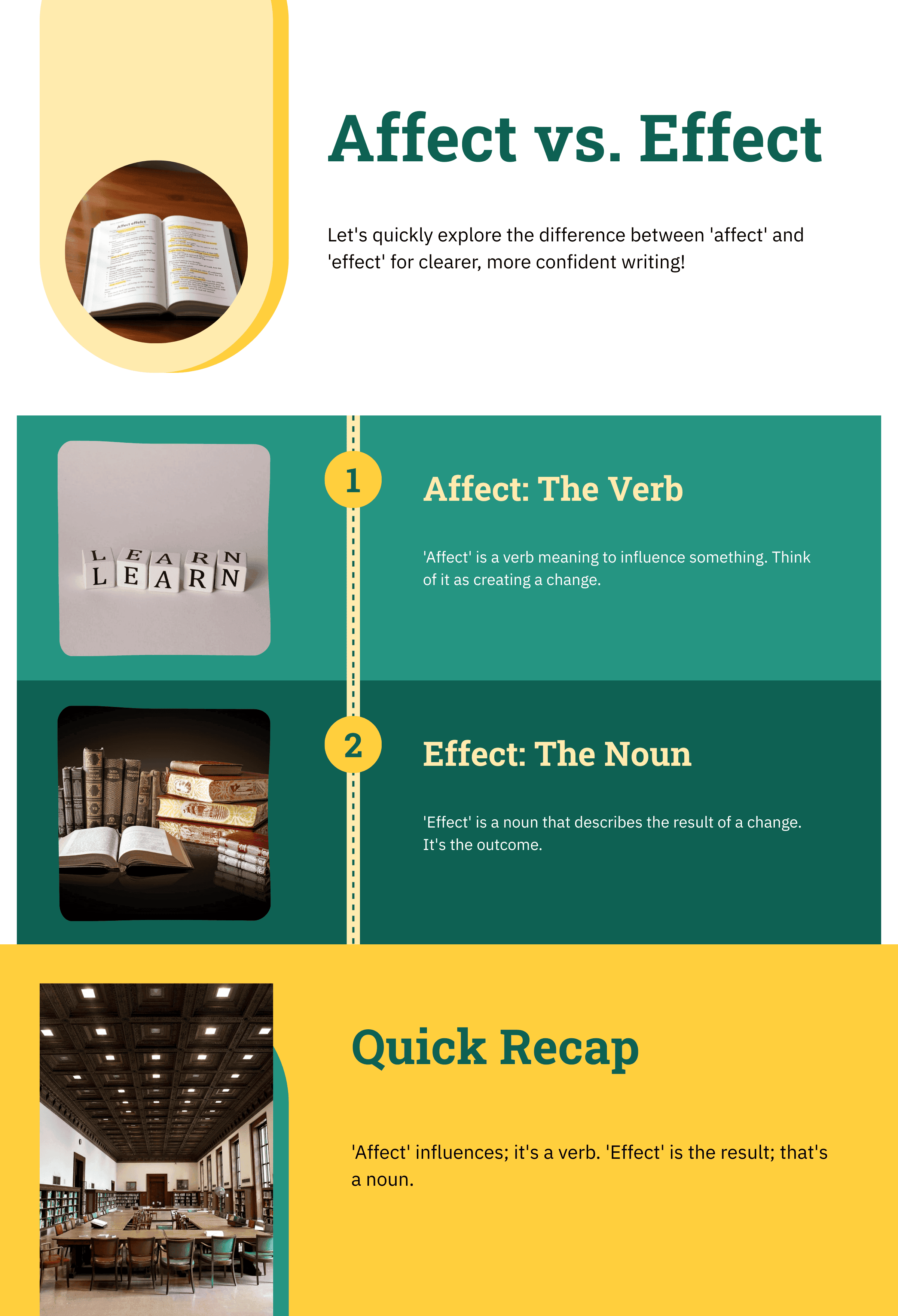
Clapingo Tips & Tricks
Remember the A/E rule: Affect = Action, Effect = End.
Do the substitution test.
Practice daily sentences: Write 3 with affect, 3 with effect.
Get real feedback, tools like Grammarly help, but live correction (likeClapingo) works best.
Conclusion
The confusion around affect vs. effect has probably affected you before and the effect is wasted time second-guessing yourself. But the rule is simple:
Affect = verb (influence)
Effect = noun (result)
Exceptions exist, but they’re rare. The key is practice, not memorization. Reading blogs helps, but speaking and writing with live correction makes usage second nature.
That’s exactly what Clapingo offers. With expert tutors guiding your English conversations, you’ll master not just affect vs effect but the hundreds of tricky grammar points that trip up learners.
So don’t just read about the difference, practice it today.
Final Takeaway
Basic Rule: Affect = Verb (influence). Effect = Noun (result).
Advanced Use: Affect as noun (psychology), effect as verb (formal “bring about”).
Collocations: Take effect, knock-on effect, directly affect, profoundly affect.
Idioms: Domino effect, ripple effect, special effects.
Nuance:Affect = personal/emotional impact, Effect = measurable outcome.
Clapingo Pro Mastery Tip: Use collocations and advanced synonyms in reports, presentations, and interviews to stand out as a confident communicator.
FAQs
Q1. What is the difference between affect and effect?
Affect is usually a verb (influence), effect is usually a noun (result).
Q2. Can effect be a verb?
Yes, it means “to bring about.” Example: “The manager effected change.”
Q3. What does affect mean in psychology?
It refers to emotion or mood. Example: “She had a cheerful affect.”
Q4. Why do people confuse them?
They sound similar, both relate to change, and overlap in meaning.
Q5. What’s the quick test?
Try replacing it with influence (affect) or result (effect).
Q6. Is ‘cause and affect’ correct?
No. It’s always “cause and effect.”
Q7. Can affect be used in past tense?
Yes. Example: “The storm affected traffic.”
Q8. Do Americans and British use them differently?
Slightly, British English uses effect as a verb more often.
Q9. How do I stop mixing them up in speech?
Practice aloud with corrections (Clapingo helps here).
Q10. Is it unprofessional to mix them up?
Yes. It can create confusion and look careless in formal writing.
Comments
Your comment has been submitted